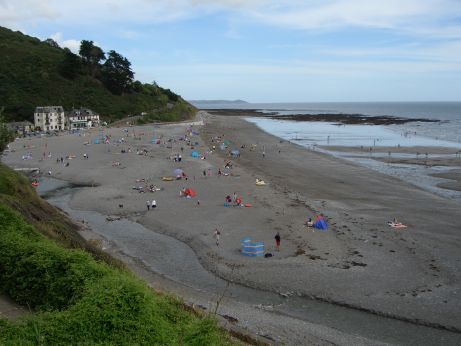Coastal Management: Who's Interested?
There are usually several groups of people, called , that are interested in the management of a coastal area. They often have different needs, ideas and expectations.
This is because there are many uses for coastal areas. Some parties will want to use the land for tourism or industry, whereas others might want to develop the fishing industry, fence the area off as a gunnery range or nature reserve, or perhaps use it as a transport route. This often means that there will be disagreements between the groups and that if one group is happy, another is not. Afterall, if the group wanting to fence the area off as a Navy gunnery range succeed in their aims, the tourists wont be allowed on the beaches, and fishing boats will be excluded from the area.
Groups that are typically involved in coastal management issues include:
Local residents: These may be retired people wanting the area to remain unspoilt
and natural, or working people needing better communications, more homes, fishing
ports etc.
Environmental Groups: A good example might be
the UK group "Surfers
Against Sewage" who campaign for clean beaches with no 'floaters' as they are
called in Cornwall. Other groups could include the National Trust, and local
groups set up to run reserves or to protect local features.
Developers: Retiring to the seaside is a popular option, but more people living
by the sea requires more homes to be built. More homes need new roads, shops,
phone lines, mobile phone masts etc.
Local Councils: These often get involved with
all the interested parties, amking decisions and offering advice. They also
have their own responsibilities such as coastal defence.
National Governments: The national government
may be represented by an organisation like the Army, a department responsible
for fishing, housing, nature preservation etc. In many countries the government
also ownes much of the coastline and takes an active interest in its development.
National Parks Authorities: These are found in the UK but other countries have equivalent organisations. The National Parks Authorities are responsible for large areas of land, usually with the aim of preserving their natural beauty whilst not damaging the economy of the area.
Visit England (Tourist Boards): These tend to
want two opposite goals - a beaufiful unspoilt coastline, and lots of tourist
attractions. These can exist alongside eachother but on other occasions it
can be inpossible to have both. For example, a wild coastline can have a well
managed National Park that attracts tourists but it will also need large roads,
carparks, sewage and refuse services.
These groups sometimes agree with eachother but often have conflicting aims.
Here we can see small sailing dinghies racing in Chichester Harbour,UK. The area is popular with tourists and weekend sailors, but also supports nature reserves, sites of historical interest and businesses such as fishing and tourism. Lots of small boats racing are not good if swimming, fishing and nature reserves all compete for the same areas. Boats need space, and swimmers need space where they won't be hit by sailing boats! Power boats are also used, but they cause pollution and erosion, so there are speed limits in certain areas. |
|
 d d |
This is Seaton beach, in Cornwall, UK. The photograph was taken in the summer and shows how the sandy beach is used by tourists. Note that there is housing at the top of the beach and a road running down the side of the hill towards the beach. Here there are several different interested parties, the locals who live there, the local council who has to clean up after the tourists, the local water company who must test the river water every week, visiting tourists who want places to stay , easy access to the beach and safe sand for their children. Just round the corner is a section of coastline that is out of bounds. It is used by the Royal Navy for gunnery practice and the beach may contain live bombs and shells! |
![]()
